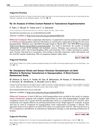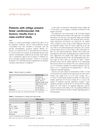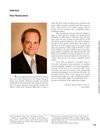
Search
for
Sort by
Research
900-930 / 1000+ results

research Post Finasteride Syndrome: Is Dutasteride Unfairly Accused?

research Interactions Between Lower Urinary Tract Symptoms and Cardiovascular Risk Factors Determine Distinct Patterns of Erectile Dysfunction: A Latent Class Analysis
Men's age, urinary symptoms, and heart health risks create different types of erectile dysfunction.

research Treatment of Recurrent Priapism in Sickle Cell Anemia With Finasteride: A New Approach
Finasteride helps reduce priapism in sickle cell anemia patients.

research The Corpus Cavernosum After Treatment With Dutasteride or Finasteride: A Histomorphometric Study in a Benign Prostatic Hyperplasia Rodent Model
Dutasteride caused more penile tissue changes than finasteride, possibly increasing erectile dysfunction risk.

research Adverse Effects of Sports Supplements in Men
Some sports supplements can cause health issues like mood swings, hair loss, and heart problems in men.

research Clomiphene Citrate and Human Chorionic Gonadotropin Are Both Effective in Restoring Testosterone in Hypogonadism: A Short-Course Randomized Study
Clomiphene citrate is a cheap and simple treatment for low testosterone that works as well as human chorionic gonadotropin, alone or combined, especially for men who want to keep their fertility.

research Diseases of the Skin: Treatment of Scalp Disorders
The document concludes that scalp disorders can be treated with hair washing, specific shampoos, medications, and sometimes surgery or hair transplants, but hereditary baldness is untreatable.

research Delayed Puberty: Diagnosis and Management of Congenital Idiopathic Hypogonadotropic Hypogonadism
A 19-year-old male with delayed puberty was successfully treated for a condition that prevents normal hormone production.

research Alopecia: Managing the Basics
The document concludes that treatments for female hair loss and excess body hair are available, but managing expectations is important.

research Androgen Metabolism as It Affects Hair Growth in Androgenetic Alopecia
Too much androgen can cause hair loss; finasteride may help.

research Hormonal Regulation of Hair Follicles Exhibits a Biological Paradox
Androgens can both stimulate and cause hair loss, and understanding their effects is key to treating hair disorders.

research Patients With Vitiligo Present Fewer Cardiovascular Risk Factors: Results From a Case-Control Study
People with vitiligo may have a lower risk of heart disease.

research Cosmetic Concerns Among Men
More men are getting cosmetic procedures, mainly for aging, hair loss, and to keep masculine features, with growing interest in both surgical and noninvasive treatments.

research Finasteride and the Uncertainties of Establishing Harms
Finasteride's potential harms are hard to accurately measure.

research Progranulin, A Secreted Tumorigenesis And Dementia-Related Factor, Regulates Mouse Hair Growth
Progranulin overexpression leads to shorter, thinner hair and increased cell death in mouse hair follicles.

research Sebaceous Carcinoma Arising at a Chronic Candidiasis Skin Lesion of a Patient with Keratitis-Ichthyosis-Deafness (KID) Syndrome
A man with KID syndrome developed a rare cancer in a long-term skin infection.

research Androgen Metabolism as It Affects Hair Growth in Androgenetic Alopecia
Androgens, like DHT, affect hair growth and treatments like finasteride may help.

research Reversible Myopathy and Ophthalmoparesis After Low-Dose Finasteride Administration for Androgenic Alopecia
Low-dose finasteride may cause muscle weakness and eye issues, but stopping the drug can lead to recovery.

research Hair Restoration: History and Evolution of Techniques
Hair restoration techniques have evolved from large punch grafts to microfollicular unit transplants, with future advancements potentially including hair cloning.

research Fortnightly Review: Male Pattern Androgenetic Alopecia
Hair loss in men is common, treatable, but not curable.

research The Human Hair: From Anatomy to Physiology
The document concludes that hair is complex, with a detailed growth cycle, structure, and clinical importance, affecting various scientific and medical fields.

research Pharmacology of Antiandrogens
Antiandrogens affect androgen-dependent body functions and are used for various medical conditions, with some risks like fetus feminization, but new forms like 17α-propylmesterolone show promise for acne without systemic effects.

research Androgenetic Alopecia in Men and Women
Androgenetic alopecia involves genetics, hormones, and can be treated with medications or surgery.

research Hirsutism: A Psychological Analysis
Women with excess body hair feel psychological distress influenced by societal beauty standards, but distress isn't directly linked to the amount of hair.

research Venous and Pulmonary Thromboembolism and Combined Hormonal Contraceptives: Systematic Review and Meta-Analysis
Some birth control pills have a higher risk of blood clots than others.

research What Should It Take to Describe a Substance or Product as 'Sperm-Safe'?
Products should be called 'sperm-safe' only after thorough, well-designed tests.

research Hirsutism and the Variable Response of the Pilosebaceous Unit to Androgens
Different women's hair and skin glands respond to hormones in varied ways, which can cause unwanted hair growth even with normal hormone levels, and more research is needed to treat this effectively.

research Significance of the Polyglutamine Tract Polymorphism in the Androgen Receptor
The length of the CAG repeat in the androgen receptor gene affects the risk and progression of prostate cancer, BPH, infertility, and undermasculinized genitalia.

research Safety of Testosterone Use in Women
Short-term testosterone therapy in women seems safe with few mild side effects, but long-term effects need more research.